UGCC congregation registered in former metropolitan capital of Radomyshl
Monday, 21 November 2011, 17:33 On November 11, 2011, by the order of Zhytomyr Regional State Administration the newly established congregation of the Holy Trinity of the Ukrainian Greek Catholic Church of Radomyshl was registered.
On November 11, 2011, by the order of Zhytomyr Regional State Administration the newly established congregation of the Holy Trinity of the Ukrainian Greek Catholic Church of Radomyshl was registered.
With all confidence we can talk about the restoration of the parish of the Holy Trinity Cathedral, which actively served here for several centuries. After all, in the 18th century the Kyivan metropolitan eparchy became the center of gravity for the whole Uniate Church in Ukraine. As of 1749 the Kyiv metropolitan eparchy had 21 deaneries with 361 churches (the Radomyshl deanery had 43 churches). In 1752 the Kyiv metropolitan eparchy consisted of 824 churches. It is no wonder that in the middle of the 18th century Uniate metropolitans established the seat of the metropolitans in Radomyshl, about 100 kilometers from Kyiv, which belonged to Russia. In the second half of the same century Radomyshl became a place of permanent residence of the metropolitans of the Ukrainian Church.
The consistory in Radomyshl was arranged in 1746, the last year Athanasy Sheptytsky was metropolitan. In fact, the rise of Radomyshl occurs under Metropolitan Florian Hrebnytsky (1748-1762) and Pylyp Volodkovych (1762-1778).
In 1763 Metropolitan Pylyp Volodkovych consecrated a new cathedral in Radomyshl. During the rebellion of 1768, which was suppressed by autocratic Russia, a detachment of Colonel Prince Meshchersky raged between Zhytomir and Radomyshl. Persecution began of Uniates, who were forcibly transferred into Orthodoxy. In 1772, of 32 deaneries of the Kyiv metropolitan eparchy, 23 were transferred to Orthodoxy, and 46 Uniate priests who did not submit to the violence were imprisoned in Berdychiv. In 1773 the Uniate priests (400 people, including 43 of Radomyshl deanery) signed in Radomysl a “promise not to deviate from the union and submit to the Uniate metropolitan.”
During the visitation of 1779, Metropolitan Lev Sheptytsky died and was buried magnificently in Radomyshl.
In 1780 Yason Smohorzhevsky headed the metropolitanate. He moved his own bishop- metropolitan residence to Radomyshl. The metropolitan’s greatest achievements in Radomyshl were the establishment of a diocesan seminary for 100 students and the construction of a stone cathedral. Yason Smohorzhevsky died in Radomysl and was buried in the Cathedral of the Holy Trinity.
The last Uniate metropolitan to reside Radomyshl was Theodosii Rostotsky (1788-1805).
In 1795, after the third partition of Poland, Russia abolished the Uniate metropolitan and its residency in Radomyshl.
After the liquidation of the Uniate metropolitan in 1795, the wooden Metropolitan Cathedral of the Holy Trinity in Radomyshl became Orthodox. In 1851 the church was rebuilt on a stone foundation. In 1856 the church was again repaired, and the bell tower was reconstructed. Yet elements of Uniate decorations remained. The fate of the unfinished stone church, begun by Metropolitan Yason Smohorzhevsky, for many years was uncertain, also, perhaps, because large sums of money were needed for its completion, and Russia had to see that the Uniate Church was destroyed, like the remains of an unfinished church.
In 1927 the Holy Trinity Cathedral was destroyed and in its place the then mayor built himself a house.
The present Greek Catholics of Radomyshl did not forget the tragic fate of the Holy Trinity Cathedral. Therefore, on August 23, 2011, at a general meeting of the parish its statute was passed and the charter of His Beatitude Sviatoslav and the chairman of the Zhytomyr Regional State Administration for registering the congregation was adopted.
The clergy of Zhytomyr oversees the revived community. Soon a priest will be appointed to serve the congregation. Currently the community is being registered by the sate and a place is being sought to hold services.
http://dekanat.at.ua
LATEST NEWS

We can imagine what the prayer of the prisoners in the Russian torture centers in the Ukrainian Kharkiv region was like – Head of the UGCC on the 206th day of the war 17 September
A vast cemetery, a mass burial, was found near the city of Izyum, in which more than 400 innocently killed and tortured people have already been...
-
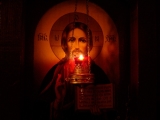 Глава УГКЦ у 158-й день війни: «Нехай Господь прийме з уст нашої Церкви псалми та моління за всіх тих, які особливо просять нашої молитви»
Глава УГКЦ у 158-й день війни: «Нехай Господь прийме з уст нашої Церкви псалми та моління за всіх тих, які особливо просять нашої молитви»
-
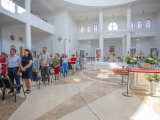 «Сила, яка походить із вірності Христові, є стержнем, який ніхто не може зламати», – Блаженніший Святослав
«Сила, яка походить із вірності Христові, є стержнем, який ніхто не може зламати», – Блаженніший Святослав
-
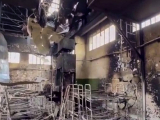 Глава УГКЦ у 157-й день війни: «В ім’я Боже ми засуджуємо звірства в Оленівці і світ повинен це засудити як особливий вияв дикості й жорстокості»
Глава УГКЦ у 157-й день війни: «В ім’я Боже ми засуджуємо звірства в Оленівці і світ повинен це засудити як особливий вияв дикості й жорстокості»
-
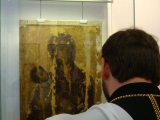 «Боже, почуй наш плач і поспіши нам на допомогу і порятунок!», – Глава УГКЦ у 156-й день війни
«Боже, почуй наш плач і поспіши нам на допомогу і порятунок!», – Глава УГКЦ у 156-й день війни
-
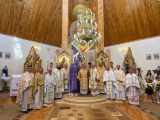 «Бог йому дав серце і душу українського народу»: відбулася щорічна проща до Прилбичів з нагоди уродин митрополита Андрея Шептицького
«Бог йому дав серце і душу українського народу»: відбулася щорічна проща до Прилбичів з нагоди уродин митрополита Андрея Шептицького
-
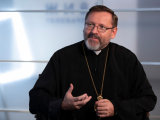 Глава УГКЦ: «Я горджуся українськими патріотами, які без найменшої краплі ненависті готові захищати своє»
Глава УГКЦ: «Я горджуся українськими патріотами, які без найменшої краплі ненависті готові захищати своє»
-
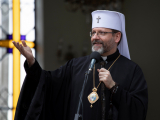 Блаженніший Святослав закликав українську молодь скласти присягу на вірність Христові
Блаженніший Святослав закликав українську молодь скласти присягу на вірність Христові
-
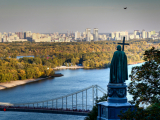 Глава УГКЦ у 155-й день війни: «Помолімося, щоб не втратити скарбу віри князя Володимира»
Глава УГКЦ у 155-й день війни: «Помолімося, щоб не втратити скарбу віри князя Володимира»
-
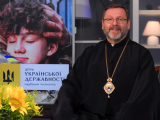 Блаженніший Святослав у День державності України: «Наша Держава – це для нас питання життя або смерті»
Блаженніший Святослав у День державності України: «Наша Держава – це для нас питання життя або смерті»
-
 Глава УГКЦ у 154-й день війни: «Нехай Господь Бог прийме у свої вічні обійми журналістів, які віддали за правду своє життя в Україні»
Глава УГКЦ у 154-й день війни: «Нехай Господь Бог прийме у свої вічні обійми журналістів, які віддали за правду своє життя в Україні»
-
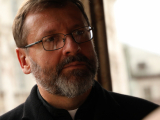 Глава УГКЦ у 153-й день війни: «Принесімо наш біль перед Боже обличчя і будьмо певні, що Він нас вислухає»
Глава УГКЦ у 153-й день війни: «Принесімо наш біль перед Боже обличчя і будьмо певні, що Він нас вислухає»
-
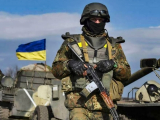 Глава УГКЦ у 152-й день війни: «Помолімся молитву заступництва за наших воїнів»
Глава УГКЦ у 152-й день війни: «Помолімся молитву заступництва за наших воїнів»
-
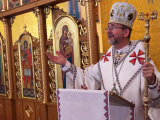 «Віруюча людина не може бути байдужою, коли бачить страждання іншої людини», – владика Богдан Дзюрах
«Віруюча людина не може бути байдужою, коли бачить страждання іншої людини», – владика Богдан Дзюрах
-
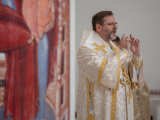 «Серед нашого страждання творімо простір для прояву Божої всемогутності», – Глава УГКЦ у 6-ту неділю після П’ятдесятниці
«Серед нашого страждання творімо простір для прояву Божої всемогутності», – Глава УГКЦ у 6-ту неділю після П’ятдесятниці
-
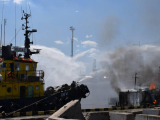 Глава УГКЦ у 151-й день війни: «Російське віроломство ми перемагаємо силою любові до нашої Батьківщини»
Глава УГКЦ у 151-й день війни: «Російське віроломство ми перемагаємо силою любові до нашої Батьківщини»

